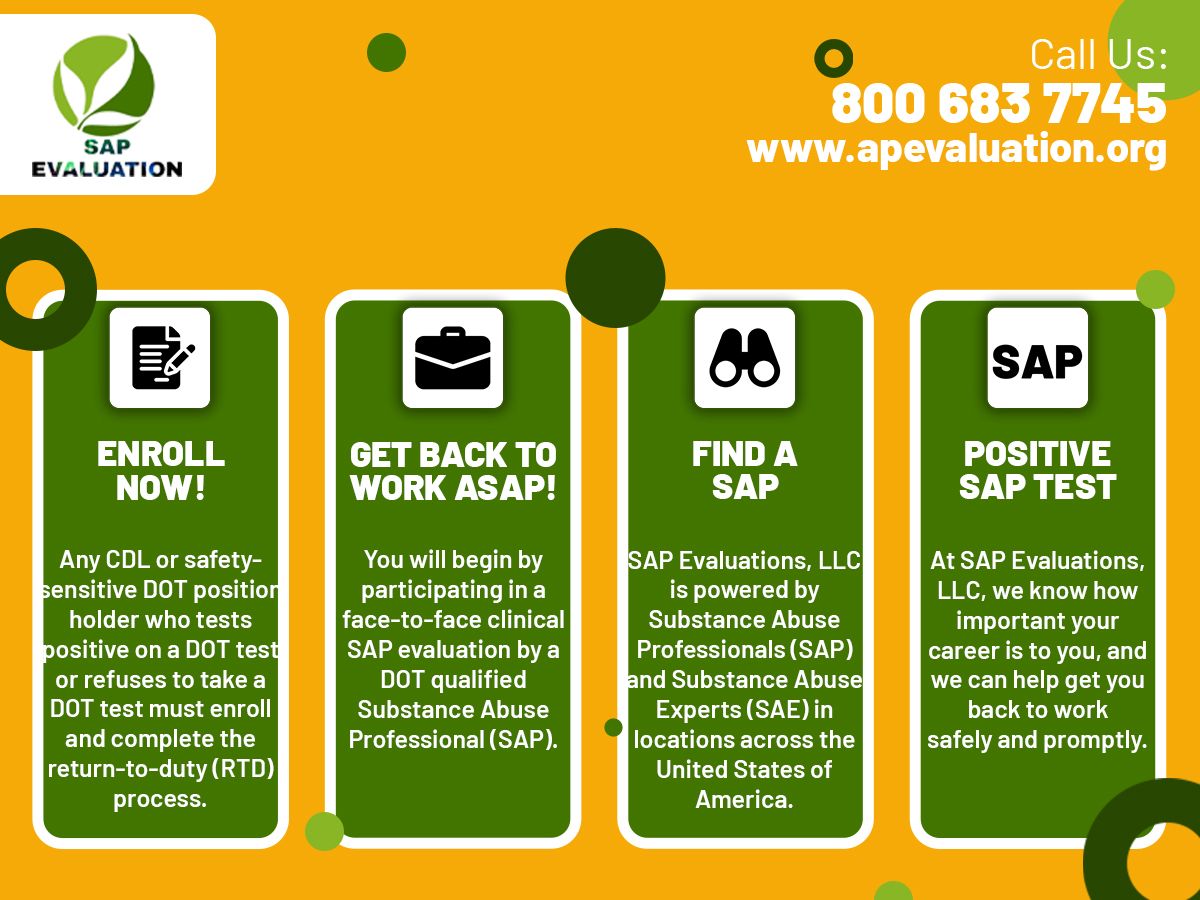
Someone who assesses safety-sensitive employees who have failed a drug and/or alcohol test and provides a plan for treatment and/or education is known as an SAP Evaluation. Employees may only be approved for a drug and/or alcohol test before returning to work if DOT SAP providers or suppliers determine that the employee has adhered to the recommended treatment and/or education.
An SAP’s responsibility is to protect the public’s interest in safety by expert evaluation of the employee and recommendations for the best education/treatment, follow-up assessments, and aftercare.
What exactly is a substance abuse professional (SAP)? SAPs examine and make suggestions for employees who have somehow broken a Department of Transportation (DOT) drug and alcohol programme rule. All of these things—education, treatment, follow-up tests, and aftercare—would be advised.
An SAP exam, often referred to as a substance abuse evaluation, is a one-on-one clinical evaluation of a person to determine precisely what is needed to treat their alcohol or drug use-related concerns. Face-to-face communication is essential because it can offer crucial physical indications that are essential to the appraisal process. Examples of this include physical slowing down or hyperactivity, tremors, needle marks, dilated pupils, jerky movements, yellow eyes, bloodshot or glazed eyes, loss of eye contact, appearance, posture, and verbal communication abilities.

A Professional must possess the following in order to be DOT-qualified in SAP Evaluation:
- A medical licence or certification (Doctor of Medicine or Osteopathy, social worker, psychologist, employee assistance professional, marriage and family therapist, Internationally Certified Alcohol and Drug Counselor)
- Took a course for DOT certification training.
- DOT SAP written test was successful.
- Every three years, 12 hours of continuing education were accomplished.
- Serving as a SAP and doing so actively
How SAP Helps Employees Find DOT SAP Provider any employee who fails a drug or alcohol test must be given a list of SAPs by employers who abide by DOT requirements. However, a lot of individuals frequently forget to double-check that the list only includes SAPs with the most recent DOT certifications. If an employee completes the return-to-duty process with a SAP that is no longer DOT-qualified, they must re-start the procedure from scratch, wasting time and money.
You will have access to SAPs in your area who are certain to be DOT-qualified when you initially get in touch with SAP Evaluation near me. This assurance eliminates the chance of having to repeat the process.
What happens if an employee’s mandatory DOT drug or alcohol test results in a positive outcome? The first answer is that, as an employer, you must prohibit that employee from engaging in any safety-sensitive DOT-covered activities and suggest that they get assistance from nearby DOT-certified substance abuse professionals (SAPs). You are not required to pay for the employee’s examination or medical care, but you must wait until they have successfully completed the DOT Return to Duty near me procedure before you can reinstate them to their jobs.
What exactly does this return to duty process entail, though? What should your employee expect? And after you’re ready, when can you send your worker back out into the field? Which is?
How Return to Duty Is Handled by SAP evaluation?
The procedure always begins with an evaluation. To evaluate the type and degree of the employee’s drug or alcohol problem, the SAP Evaluation will personally meet with them.
Here, it can be helpful to note that SAPs are clinical experts with knowledge of the detection and treatment of addiction. Additionally, they continue to take classes regarding the most recent developments in addiction therapy and maintain significant professional certifications. Additionally, they have received special recognition from the DOT. These experts are pioneers in the field of addiction therapy.
During the evaluation, the DOT Qualified SAP near me will offer suggestions for the employee’s access to medical care or educational opportunities. Again, you are not forced to bear these expenditures as the employer; the employee is then asked to consent to these treatments. Simply make sure that your workforce is aware of the options.
After finishing the therapy and/or education, the employee will have another appointment with the SAP. The SAP will then evaluate whether the employee is fit to resume work.
Only whether the person is qualified to continue work will be decided by the SAP. You, the employer, get to choose whether or not to rehire this individual.
